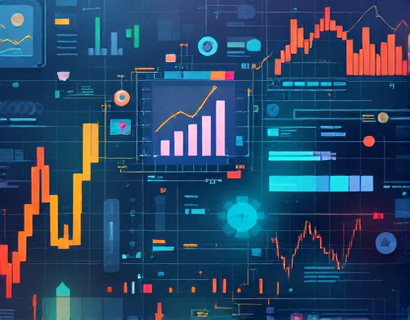Unlocking Market Mastery: Advanced Insights and Whitepapers for Economic Navigators
In the ever-evolving landscape of global economics, staying ahead requires more than just a surface-level understanding of market dynamics. For economic enthusiasts and business professionals, delving deep into advanced economic theories and strategic analyses is crucial. This article aims to guide you through the intricate world of economic mastery, offering insights from comprehensive whitepapers and expert analyses. These resources are meticulously crafted to demystify complex market behaviors and provide actionable insights for those seeking to elevate their expertise.
Understanding the Complexity of Modern Economics
Modern economics is a multifaceted discipline that intertwines with various sectors including finance, technology, and policy-making. The interconnectivity of these elements creates a dynamic and often unpredictable market environment. To navigate this complexity, professionals and enthusiasts must equip themselves with in-depth knowledge and tools. Whitepapers and expert analyses serve as invaluable resources, offering detailed explanations and forecasts that can inform strategic decision-making.
The Role of Whitepapers in Economic Mastery
Whitepapers are authoritative documents that provide detailed information on specific topics, often based on extensive research. In the context of economics, these documents delve into advanced theories, current trends, and future projections. For economic navigators, whitepapers offer a comprehensive understanding of market forces, policy impacts, and global economic shifts. They are particularly useful for professionals who need to stay updated on cutting-edge research and expert opinions.
Key Areas Covered in Economic Whitepapers
- Macroeconomic Trends: Analyzing GDP growth, inflation rates, and unemployment figures to understand overall economic health.
- Monetary Policy: Examining central bank actions and their effects on interest rates, currency values, and market stability.
- Global Trade Dynamics: Investigating trade agreements, tariffs, and their implications for international markets.
- Technological Innovations: Assessing the impact of AI, blockchain, and other technologies on economic structures and job markets.
- Sustainability and Environmental Economics: Exploring the intersection of economic growth and environmental stewardship.
Each of these areas is critical for a holistic understanding of the economic landscape. By exploring these topics in depth, professionals can better anticipate market movements and make informed decisions.
Actionable Insights from Expert Analyses
Expert analyses complement whitepapers by providing real-world applications and practical advice. These insights are often based on empirical data and case studies, offering a grounded perspective on theoretical concepts. For business professionals, these analyses can guide strategic planning, risk management, and investment decisions.
For instance, an expert analysis of recent trade policies might highlight potential risks and opportunities for a specific industry. This information can help companies adjust their supply chains, negotiate contracts, and explore new markets. Similarly, insights into technological trends can inform decisions on innovation investments and workforce development.
Case Study: Navigating Trade Policy Changes
Consider a manufacturing company facing changes in trade policies between two major economies. An expert analysis would break down the potential impacts, such as increased costs due to tariffs or new market access opportunities. The report might recommend strategies like diversifying supply chains, renegotiating contracts, or investing in local production facilities. These actionable steps can help the company mitigate risks and capitalize on emerging opportunities.
Leveraging Advanced Economic Theories
Advanced economic theories provide the foundation for understanding complex market behaviors. Concepts such as behavioral economics, game theory, and complexity economics offer unique perspectives on how markets function. By mastering these theories, professionals can develop more nuanced and effective strategies.
Behavioral Economics: Understanding Human Decision-Making
Behavioral economics combines insights from psychology and economics to explain how individuals make economic decisions. Unlike traditional economics, which assumes rational behavior, behavioral economics recognizes cognitive biases and emotional factors. For business professionals, understanding these biases can improve marketing strategies, pricing models, and consumer engagement tactics.
For example, knowing that consumers are often influenced by social proof, companies can leverage testimonials and user reviews to boost sales. In policy-making, recognizing the impact of loss aversion can lead to more effective regulatory frameworks.
Game Theory: Strategic Decision-Making in Competitive Markets
Game theory provides a framework for analyzing strategic interactions where the outcome for each participant depends on the actions of others. In business, this theory is invaluable for competitive analysis, negotiation strategies, and market entry decisions. By modeling different scenarios and predicting opponents' moves, companies can make more informed and advantageous decisions.
For instance, in a market with a few dominant players, game theory can help a new entrant determine the optimal pricing strategy to gain market share without triggering a price war.
Complexity Economics: Embracing Systemic Interactions
Complexity economics focuses on the emergent properties of interconnected systems. In economics, this means understanding how individual actions and decisions interact to create broader market trends. This approach is particularly useful for forecasting and managing systemic risks.
By applying complexity economics, professionals can better anticipate market shifts and develop resilient business models. For example, recognizing the interconnectedness of financial markets can help investors diversify portfolios and hedge against potential crashes.
Utilizing Whitepapers for Strategic Advantage
To fully leverage the benefits of whitepapers and expert analyses, it's essential to integrate these insights into your decision-making processes. Here are some steps to effectively utilize these resources:
- Stay Updated: Regularly review new whitepapers and analyses to stay informed about the latest research and trends.
- Apply Insights: Translate theoretical insights into practical strategies. For example, use macroeconomic forecasts to adjust financial planning.
- Collaborate: Share findings with colleagues to foster a culture of continuous learning and innovation.
- Scenario Planning: Use expert analyses to develop robust scenario plans that account for various market conditions.
- Continuous Learning: Encourage ongoing education and training to deepen understanding of advanced economic concepts.
By systematically incorporating these insights, professionals can enhance their strategic acumen and drive sustainable success in their respective fields.
Conclusion
Mastering modern economics is a continuous journey that requires a deep dive into advanced theories and practical applications. Whitepapers and expert analyses serve as essential tools in this journey, providing the knowledge and insights needed to navigate complex market dynamics. By embracing these resources, economic navigators can elevate their expertise, make informed decisions, and achieve long-term success.










































